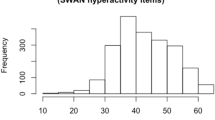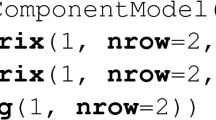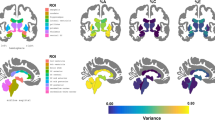Abstract
Assessment of genetic influences on behavior depends on context, informants, and study design: We show (analytically) that, conditional on study design, informant specific genetic variance is included in the genetic variance component or in the environmental variance component. To aid the explanation, we present an illustrative empirical analysis of data from the Netherlands Twin Register. Subjects included 1,571 monozygotic and 2,672 dizygotic 12-year-old twin pairs whose attention problems (AP) were rated by their parents, teachers, and themselves. Heritability estimates (h 2) of AP were about ~0.75 for same informant ratings (mother, father, and same teacher ratings) and ~0.54 for different informants’ ratings (different parents’, different teachers’, and two twins’ self-ratings). Awareness of assessment effects is relevant to research into psychiatric disorders. Differences in assessment can account for age effects, such as a drop in heritability of ADHD symptoms. In genome-wide association studies, effects of rating specific genetic influences will be undetectable.




Similar content being viewed by others
Notes
Fitting a bivariate model on mother and father AP ratings revealed that the contribution of common genetic variance to phenotypic variance was indeed around 55 %, whereas the total estimated heritability coefficients were on average 75 %. For obvious reasons bivariate models could not be fitted on same and different teacher ratings or on self-ratings.
References
Achenbach T, Rescorla LA (2001) Manual for the ASEBA school-age forms & profiles. University of Vermont, Research Center for Children, Youth, and Families, Burlington
Arseneault L, Mofftt TE, Caspi A, Taylor A, Rijsdijk FV, Jaffee SR, Ablow JC, Measelle JR (2003) Strong genetic effects on cross-situational antisocial behaviour among 5-year-old children according to mothers, teachers, examiner-observers, and twins self-reports. J Child Psychol Psychiatry 44(6):832–848
Bartels M, Hudziak JJ, Boomsma DI, Rietveld MJ, van Beijsterveldt CEM (2003a) A study of parent ratings of internalizing and externalizing problem behavior in 12-year-old twins. J Am Acad Child Adolesc Psychiatry 42(11):1351–1359
Bartels M, Hudziak JJ, van den Oord EJCG, van Beijsterveldt CEM, Rietveld MJH, Boomsma DI (2003b) Co-occurrence of aggressive behavior and rule-breaking behavior at age 12: multi-rater analyses. Behav Genet 33(5):607–621
Bartels M, van Beijsterveldt CEM, Derks EM, Stroet TM, Polderman TJ, Hudziak JJ, Boomsma DI (2007a) Young Netherlands twin register (y-ntr): a longitudinal multiple informant study of problem behavior. Twin Res Hum Genet 10(1):3–11
Bartels M, Boomsma DI, Hudziak JJ, van Beijsterveldt CEM, Oord EJCG (2007b) Twins and the study of rater (dis) agreement. Psychol Methods 12(4):451–466
Boomsma DI, van Beijsterveldt CEM, van Hudziak JJ (2005) Genetic and environmental influences on anxious/depression during childhood: a study from the Netherlands twin register. Genes Brain Behav 4(8):466–481
Boomsma DI, Saviouk V, Hottenga JJ, Distel MA, de Moor MHM, Vink JM, Geels LM, van Beek JH, Bartels M, de Geus EJ, Willemsen G (2010) Genetic epidemiology of attention deficit hyperactivity disorder (ADHD index) in adults. PLoS One 5(5):e10621
Burt SA, McGue MK, Krueger RF, Iacono WG (2005) Sources of covariation among the child-externalizing disorders: informant effects and the shared environment. Psychol Med 35(8):1133–1144
Carey G (1986) Sibling imitation and contrast effects. Behav Genet 16(3):319–341
Chang Z, Lichtenstein P, Asherson PJ, Larsson H (2013) Developmental twin study of attention problems high heritabilities throughout development. JAMA Psychiatry 70(3):311–318
Derks EM, Hudziak JJ, van Beijsterveldt CEM, Dolan CV, Boomsma DI (2006) Genetic analyses of maternal and teacher ratings on attention problems in 7-year-old Dutch twins. Behav Genet 36(6):833–844
Derks EM, Hudziak JJ, Boomsma DI (2009) Genetics of ADHD, hyperactivity, and attention problems. In: Kim YK (ed) Handbook of behavior genetics. Springer, New York
Eaves L, Silberg J, Meyer J, Maes H, Simonoff E, Pickles A, Rutter M, Neale MC, Reynolds C, Erickson M, Heath A, Loeber R, Truett K, Hewitt H (1997) Genetics and developmental psychopathology: 2 the main effects of genes and environment on behavioral problems in the Virginia twin study of adolescent behavioral development. J Child Psychol Psychiatry 38(8):965–980
Falconer D, Mackay T (1996) Introduction to quantitative genetics. Longman, New York
Faraone SV, Perlis RH, Doyle AE, Smoller JW, Goralnick JJ, Holmgren MA, Sklar P et al (2005) Molecular genetics of attention-deficit/hyperactivity disorder. Biol Psychiatry 57(11):1313–1323
Haberstick B, Timberlake D, Hopfer C, Lessem J, Ehringer M, Hewitt J (2008) Genetic and environmental contributions to retrospectively reported DSM-IV childhood attention deficit hyperactivity disorder. Psychol Med 38(7):1057–1066
Hartman CA, Rhee SH, Willcutt EG, Pennington BF (2007) Modeling rater disagreement for ADHD: are parents or teachers biased? J Abnorm Child Psychol 35(4):536–542
Haworth C, Wright M, Luciano M, Martin N, De Geus EJ, Van Beijsterveldt CEM, Bartels M, Posthuma D, Boomsma D, Davis O et al (2009) The heritability of general cognitive ability increases linearly from childhood to young adulthood. Mol Psychiatry 15(11):1112–1120
Hewitt JK, Silberg JL, Neale MC, Eaves LJ, Erickson M (1992) The analysis of parental ratings of children’s behavior using LISREL. Behav Genet 22(3):293–317
Hoekstra RA, Bartels M, Hudziak JJ, van Beijsterveldt CEM, Boomsma DI (2008) Genetic and environmental influences on the stability of withdrawn behavior in children: a longitudinal, multi-informant twin study. Behav Genet 38(5):447–461
Jang KL, Lam RW, Livesley WJ, Vernon PA (1997) Gender differences in the heritability of seasonal mood change. Psychiatry Res 70(3):145–154
Kan KJ, Ploeger A, Raijmakers MEJ, Dolan CV, van der Maas HLJ (2010) Nonlinear epigenetic variance: review and simulations. Dev Sci 13(1):11–27
Kan KJ, Dolan CV, Nivard MG, Middeldorp CM, van Beijsterveldt CEM, Willemsen G, Boomsma DI (2013a) Genetic and environmental stability in attention problems across the lifespan: evidence from the Netherlands twin register. J Am Acad Child Adolesc Psychiatry 52(1):12–25
Kan KJ, Wicherts JM, Dolan CV, van der Maas HLJ (2013b) On the nature and nurture of intelligence and specific cognitive abilities: the more heritable, the more culture-dependent. Psychol Sci 24(12):2420–2428
Kendler K, Gardner C, Lichtenstein P (2008) A developmental twin study of symptoms of anxiety and depression: evidence for genetic innovation and attenuation. Psychol Med 38(11):1567–1575
Lamb DJ, Middeldorp CM, van Beijsterveldt CEM, Boomsma DI (2012) Gene-environment interaction in teacher-rated internalizing and externalizing problem behavior in 7-to 12-year-old twins. J Child Psychol Psychiatry 53(8):818–825
Larsson H, Asherson P, Chang Z, Ljung T, Friedrichs B, Larsson J, Lichtenstein P (2012) Genetic and environmental influences for adult attention-deficit hyperactivity disorder symptoms: a large swedish population-based study of twins. Psychol Med 1(1):1–11
Manolio TA, Collins FS, Cox NJ, Goldstein DB, Hindorff LA, Hunter DJ, McCarthy MI, Ramos EM, Cardon LR, Chakravarti A et al (2009) Finding the missing heritability of complex diseases. Nature 461(7265):747–753
Martin N, Scourfield J, McGuffin P (2002) Observer effects and heritability of childhood attention-deficit hyperactivity disorder symptoms. Br J Psychiatry 180(3):260–265
McLoughlin G, Rijsdijk F, Asherson P, Kuntsi J (2011) Parents and teachers make different contributions to a shared perspective on hyperactive-impulsive and inattentive symptoms: a multivariate analysis of parent and teacher ratings on the symptom domains of ADHD. Behav Genet 41(5):668–679
Merwood A, Greven C, Price T, Kuntsi J, McLoughlin G, Larsson H, Asherson P (2013) Different heritabilities but shared aetiological influences for parent, teacher and self-ratings of ADHD symptoms: an adolescent twin study. Psychol Med 43(9):1973–1984
Molenaar PCM, Boomsma DI, Dolan CV (1993) A third source of developmental differences. Behav Genet 23(6):519–524
Muthén LK, Muthén BO (1998–2011) Mplus user’s guide, 6th edn. Muthén & Muthén, Los Angeles
Plomin R, DeFries J, Knopik V, Neiderhiser J (2012) Behavioral genetics, 6th edn. Worth, New York
Polderman TJ, Posthuma D, De Sonneville LM, Verhulst FC, Boomsma DI (2006) Genetic analyses of teacher ratings of problem behavior in 5-year-old twins. Twin Res Hum Genet 9(1):122–130
Rice F, Harold G, Thapar A (2002) The genetic aetiology of childhood depression: a review. J Child Psychol Psychiatry 43(1):65–79
Rietveld M, Posthuma D, Dolan CV, Boomsma DI (2003) ADHD: sibling interaction or dominance: an evaluation of statistical power. Behav Genet 33(3):247–255
Saviouk V, Hottenga JJ, Slagboom EP, Distel MA, de Geus EJ, Willemsen G, Boomsma DI (2011) ADHD in Dutch adults: heritability and linkage study. Am J Med Genet B 156(3):352–362
Sherman DK, McGue MK, Iacono WG (1997) Twin concordance for attention deficit hyperactivity disorder: a comparison of teachers’ and mothers’ reports. Am J Psychiatry 154(4):532–535
Simonoff E, Pickles A, Hervas A, Silberg J, Rutter M, Eaves L (1998) Genetic influences on childhood hyperactivity: contrast effects imply parental rating bias, not sibling interaction. Psychol Med 28(4):825–837
Trzaskowski M, Dale PS, Plomin R (2013) No genetic influence for childhood behavior problems from DNA analysis. J Am Acad Child Adolesc Psychiatry 52(10):1048–1056
Turkheimer E (2004) Spinach and ice cream: why social science is so difficult. In: DiLalla L (ed) Behavior genetics principles: perspectives in development, personality, and psychopathology. Am Psychol Assoc, Washington, DC
van Beijsterveldt CEM, Groen-Blokhuis M, Hottenga JJ, Franic S, Hudziak JJ, Lamb D, Huppertz C, de Zeeuw E, Nivard MG, Schutte N et al (2013) The young Netherlands twin register (yntr): longitudinal twin and family studies in over 70,000 children. Twin Res Hum Genet 16(1):252–267
van den Berg SM, Willemsen G, de Geus EJ, Boomsma DI (2006) Genetic etiology of stability of attention problems in young adulthood. Am J Med Genet B 141(1):55–60
Vink JM, Bartels M, van Beijsterveldt TC, van Dongen J, van Beek JH, Distel MA, Boomsma DI (2012) Sex differences in genetic architecture of complex phenotypes? PLoS One 7(12):e47371
Wood AC, Rijsdijk F, Saudino KJ, Asherson P, Kuntsi J (2008) High heritability for a composite index of children’s activity level measures. Behav Genet 38(3):266–276
Wright S (1934) The method of path coefficients. Ann Math Stat 5(3):161–215
Yang J, Lee SH, Goddard ME, Visscher PM (2011) GCTA: a tool for genome-wide complex trait analysis. Am J Hum Genet 88(1):76–82
Acknowledgments
We gratefully acknowledge the following Grants: Genetic influences on stability and change in psychopathology from childhood to young adulthood (ZonMW 912-10-020); Genetics of Mental Illness (European Research Council; ERC-230374) and support from the Neuroscience Campus Amsterdam (NCA). We thank Tina Glasner, Evelien de Zeeuw, Michelle van Fulpen, and Cyrina Brouwer for their assistance in the acquisition of the data and for administrative, technical, and material support.
Conflict of Interest
Kees-Jan Kan, Catharina E. M. van Beijsterveldt, Meike Bartels, and Dorret Boomsma declare that they have no conflict of interest.
Human and Animal Rights and Informed Consent
All procedures followed were in accordance with the ethical standards of the responsible committee on human experimentation (institutional and national) and with the Helsinki Declaration of 1975, as revised in 2008. Informed consent was obtained from the parents of all participants for being included in the study.
Author information
Authors and Affiliations
Corresponding author
Additional information
Edited by Deborah Finkel.
Rights and permissions
About this article
Cite this article
Kan, KJ., van Beijsterveldt, C.E.M., Bartels, M. et al. Assessing Genetic Influences on Behavior: Informant and Context Dependency as Illustrated by the Analysis of Attention Problems. Behav Genet 44, 326–336 (2014). https://doi.org/10.1007/s10519-014-9657-7
Received:
Accepted:
Published:
Issue Date:
DOI: https://doi.org/10.1007/s10519-014-9657-7




